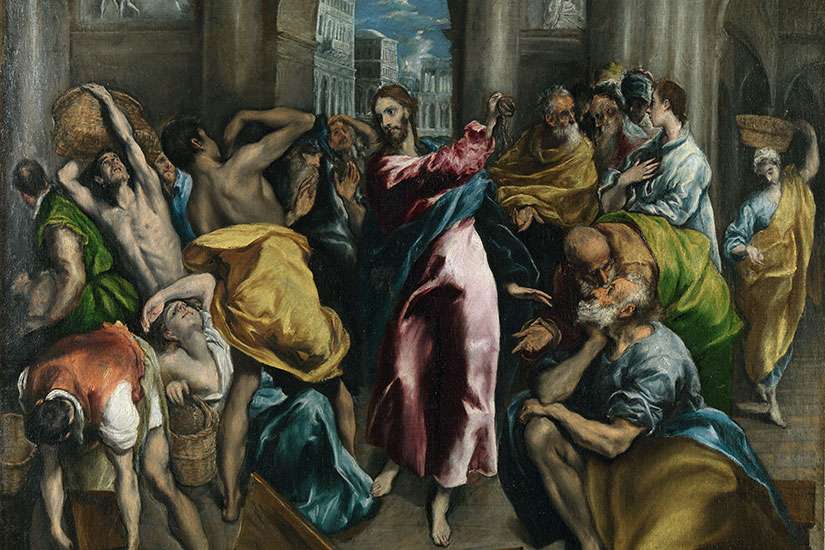With the people shouting out in triumph, Jesus entered into the temple area, not to do homage but to challenge the temple and its leaders. He overturned the tables of the moneychangers and upset the stalls of those selling birds and animals for the sacrifice. His startling words and actions in the temple, whether they are from the Synoptic accounts or John’s account, took on new meaning for later generations of Christians. “Take these things out of here! Stop making my Father’s house a marketplace!” (literally an emporium or a mall!) The temple was not a shopping mall but rather a holy place of the Father. Like the prophets before Him, Jesus tried to awaken the hearts of His people.
Jesus’ disciples recall Him saying in the temple the words of Psalm 68:10: “Zeal for your house will consume me.” I have often understood this verse to mean: “I am filled with a burning love for your house.” When the magnificent Temple of Jerusalem had been destroyed by the Romans, and both Jews and Christians grieved at its loss, the followers of Jesus recalled this incident in the temple. Now they could see new meaning in it; it was a sign that the old temple was finished but a new temple was to be built. This new temple would not be of stone and wood and gold. It would be a living temple of holy people (I Peter 2:4-6; Ephesians 2:19-22).
One intriguing aspect of this Gospel story is the portrait of an angry Jesus in the temple-cleansing scene that gives way to two extremes in our own image of the Lord. Some people wish to transform an otherwise passive Christ into a whip-cracking revolutionary. Others would like to excise any human qualities of Jesus and paint a very meek, bland character, who smiled, kept silent and never rocked the boat. The errors of the old extreme, however, do not justify a new extremism.
Jesus was not exclusively, not even primarily, concerned with social reform. Rather, He was filled with a deep devotion and burning love for His Father and the things of His Father. He wanted to form new people, created in God’s image, who are sustained by His love, and bring that love to others. Jesus’ disciples and apostles recognized Him as a passionate figure — one who was committed to life and to losing it for the sake of truth and fidelity.
I cannot think of this Gospel scene of Jesus purifying the temple without remembering with deep gratitude one of the Church’s newest martyrs, Archbishop Oscar Romero. When he became bishop in 1970, there was growing unrest in El Salvador, as many became more aware of the great social injustices of the peasant economy. His pulpit became a font of truth when the government censored news. He risked his own life as he defended the poor and oppressed. He walked among the people and listened. “I am a shepherd,” he said, “who, with his people, has begun to learn a beautiful and difficult truth: our Christian faith requires that we submerge ourselves in this world.”
Killed by an assassin’s bullet as he celebrated Mass on March 24, 1980, his last words in the sermon just minutes before his death reminded his congregation of the parable of the wheat. “Those who surrender to the service of the poor through love of Christ, will live like the grain of wheat that dies. It only apparently dies. If it were not to die, it would remain a solitary grain. The harvest comes because of the grain that dies…” He is buried in the Cathedral of San Salvador where he preached justice and defended the faith fearlessly, with boldness and courage. The spirituality and faith behind Romero’s struggle for life flows from his belief in the God of the living who enters into human history to destroy the forces of death and allow the forces of life to heal, reconcile and lift up those who walk in the valley of death. Poverty and death go together.
Romero understood more and more that being a pastor to all meant starting with the poor. Placing the poor at the centre of the pastoral concerns of the Church and therefore of all Christians, including the rich, was the new pastoral way. His preferential love for the poor was an extreme, consistent, revolutionary call to conversion and truth for his entire country and to many countries. Romero was not partisan, although to some he appeared that way; rather, he was a pastor who sought the common good of all, starting, however, with the poor. He never ceased to seek out the way of justice and peace for his homeland. In doing so he has helped to purify El Salvador and many other lands and to challenge the Church to examine its own forms of idolatry and ignorance of the poor that still plague us today.
(Fr. Rosica is CEO of Salt and Light Catholic Media Foundation and English language assistant, Holy See Press Office. For more of Fr. Rosica, visit saltandlighttv.org/rosicareflections.)

